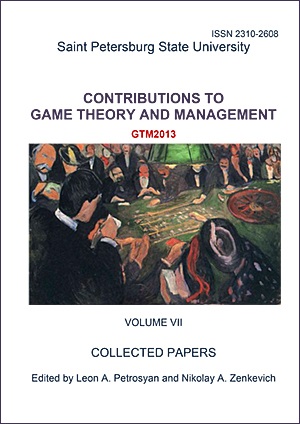Strictly Strong (N-1)-equilibrium in N-person Multicriteria Games
Abstract
Using some specific approach to the coalition-consistency analysis in n-person multicriteria games we introduce two refinements of (weak Pareto) equilibria: the strong and strictly strong (n−1)-equilibriums. Axiomatization of the strictly strong (n−1)-equilibria (on closed families of multicriteria games) is provided in terms of consistency, strong one-person rationality, suitable variants of Pareto optimality and converse consistency axiom and others.
Keywords:
multicriteria games, Pareto equilibria, strong equilibrium, consistency, axiomatizations
Downloads
References
Downloads
Published
How to Cite
Issue
Section
License
Articles of "Contributions to Game Theory and Management" are open access distributed under the terms of the License Agreement with Saint Petersburg State University, which permits to the authors unrestricted distribution and self-archiving free of charge.




